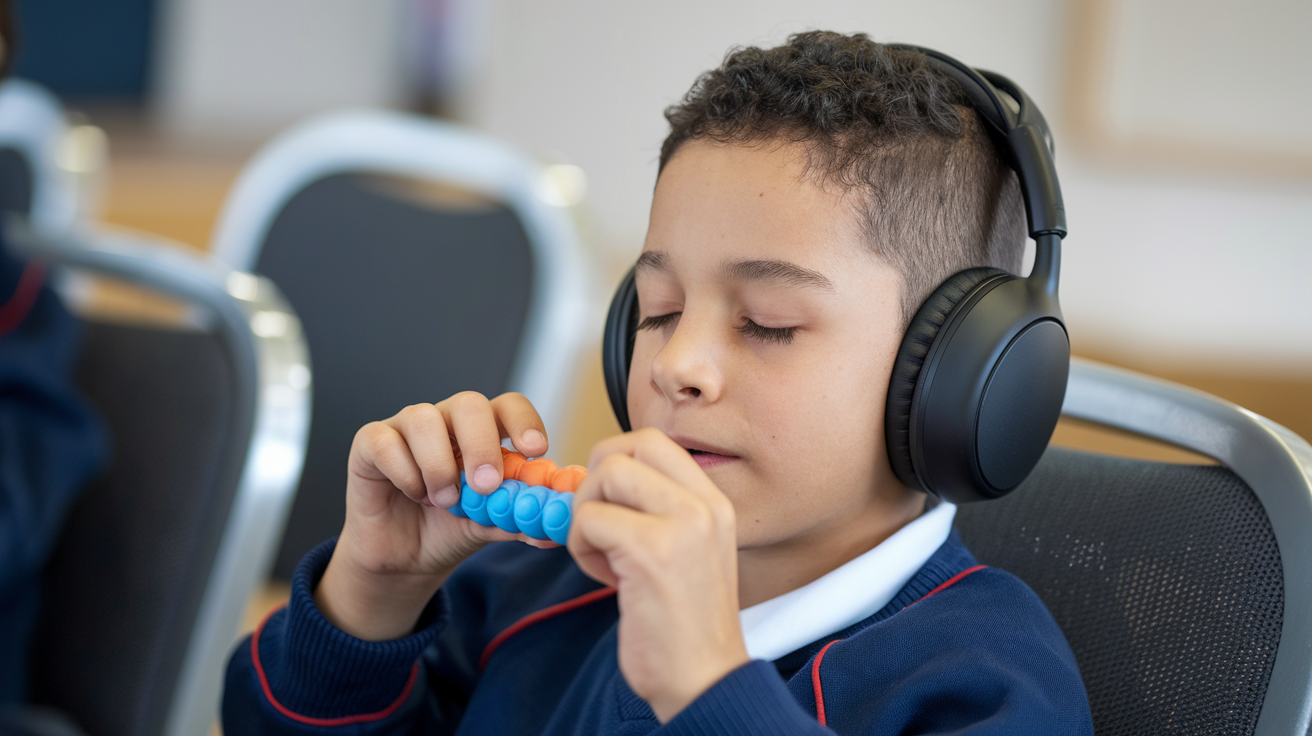As an autism mom, I can still vividly recall the gut-wrenching feeling of helplessness as I watched my young son, Idan, cry, scream, and bang his head during those meltdowns that seemed to come out of nowhere. I’d try everything—hugging him, offering his favorite snacks, speaking in the calmest voice I could muster—but nothing ever seemed to break through the overwhelming storm he was trapped in.

Over time, the constant cycle of meltdowns and my own powerlessness started to wear me down. I found myself questioning my own abilities as a mother. Was I failing Idan? Was I not trying hard enough? Well-meaning but misguided advice from friends—”Maybe you just need to discipline him better”—only added to the confusion and pain.
I hit my breaking point one morning. We were running late for kindergarten (again), all because Idan had an epic meltdown over a minor change in his routine. He was desperate to take his usual street route so he could see the air conditioning units outside a few nearby buildings—a fascination he’d had since he was two years old. Watching those fans spin behind the grills always captivated him like nothing else could.
But that morning, we didn’t have time. I told him no. And that’s when things went from bad to worse. His cries turned to shrieks, and then, in his desperation, he started biting and spitting at me. As I wiped his saliva from my shirt, something inside me snapped. For one terrifying moment, the thought of lashing out—of yelling or doing something I’d regret—flashed through my mind.
That moment scared me more than anything. I knew I needed help, so I made an emergency call to a psychiatrist who worked with caregivers of autistic children. It was the best decision I could’ve made. I started taking antidepressants and began seeing a therapist twice a month to work through my own struggles. Prioritizing my mental health wasn’t easy—it felt selfish at first—but it was necessary. I couldn’t let my frustration override my love for my son.
The tools and validation I got through therapy changed everything. I was able to cope, to step back when emotions ran high, and most importantly, to never let myself reach that dark place again.
If there’s one thing I want other autism parents to know, it’s this: You are not alone. Those overwhelming feelings we all face—exhaustion, anger, guilt—are far more common than you might think. But you can’t pour from an empty cup. Taking care of yourself is not only okay, it’s essential. Compassion and answers are out there. Reach for them. You and your child are worth it.
The journey through your child’s autism meltdowns can feel like navigating through dense fog. When faced with intense behavioral episodes, you might feel lost and overwhelmed. Understanding that meltdowns are not tantrums but rather signs of sensory or emotional overload is your first step toward clarity. Research shows that approximately 80% of children with autism experience regular meltdowns, making this a common challenge you’re not facing alone.
What Triggers Meltdowns in Autistic Children?
Even the smallest triggers can lead to overwhelming responses in children with autism. Understanding the complex interplay between sensory processing, environmental factors, and emotional regulation is crucial for parents and caregivers. After identifying these patterns, you can develop effective strategies to support your child through challenging moments.
Common Sensory Triggers
Triggers that can overwhelm your child’s sensory system include:
- Loud noises (like vacuum cleaners or hand dryers)
- Bright lights (especially fluorescent lighting)
- Strong smells (perfumes or cleaning products)
- Tactile sensations (certain fabric textures)
- Visual movement (flickering lights or crowds)
| Trigger Type | Common Examples |
|---|---|
| Auditory | Sudden loud noises, background chatter |
| Visual | Bright lights, rapid movements |
| Tactile | Clothing tags, certain textures |
| Olfactory | Strong perfumes, food odors |
| Proprioceptive | Crowded spaces, physical contact |
Environmental Factors That Overwhelm
Even seemingly minor changes in your child’s environment can trigger sensory overload. Common environmental challenges include:
- Temperature fluctuations
- Crowded spaces
- New environments
- Changes in routine
Social and Communication Challenges
Sensory overload often combines with social communication difficulties, creating additional stress for your child. Environmental factors like noisy classrooms or busy playgrounds can make it especially challenging for your child to process social cues and maintain emotional regulation. Perceiving these challenges early helps you provide appropriate support and prevent potential meltdowns.
Meltdowns often involve feeling emotionally overwhelmed and losing control. The technical term is “dysregulation” – meaning disordered management of sensations, emotions or impulses that commonly occurs with ASD.
Brain imaging studies reveal autistic individuals have unusually high baseline arousal, even when calm. Daily bombardment from lights, sounds, touching etc. piles onto this, exceeding capacity to self-soothe. Hence seemingly small triggers provoke big reactions.
As loving protectors, discovering our child’s overload threshold then proactively easing sources of stress prevents the clouds from gathering into storms. Adjusting communication, environments and direct support helps stabilize their emotional ship even amidst choppy waters.
What Are the Best Strategies for De-Escalating Meltdowns?
Once again, when facing an autism meltdown, having a well-prepared strategy can make the difference between prolonged distress and successful de-escalation. Your emergency toolbox should include proven calming techniques, sensory aids, and communication tools tailored to your child’s specific needs. According to recent studies, over 85% of autistic children respond positively to personalized de-escalation strategies when implemented consistently and compassionately.
Immediate Response Techniques
To effectively manage a meltdown situation, your first response should focus on creating a safe, calm environment. Whether you’re at home, in a grocery store, or at a family gathering, immediately reduce sensory input by dimming lights, lowering voices, or moving to a quieter space. Your calm demeanor serves as an anchor for your child during these overwhelming moments.
Effective Communication Methods During Crisis
The key to crisis communication lies in your ability to remain patient and consistent. Using visual supports, simple phrases, or alternative communication methods that your child is familiar with can help bridge the gap when verbal communication becomes challenging. Never force communication during a meltdown – instead, offer gentle reassurance and understanding.
Toolbox importants for communication include picture cards, communication apps, or simple hand signals that you’ve practiced during calmer moments. These tools become especially valuable in public settings where traditional methods might be less effective. Research shows that visual communication tools can reduce meltdown duration by up to 60% when used appropriately.
Safety Measures and Boundaries
From establishing a designated calm-down space at home to identifying safe zones in public places, your safety protocol should be clear and consistent. Always prioritize physical safety while maintaining emotional support. Whether at school, the park, or during family visits, having predetermined boundaries helps prevent escalation.
With proper safety measures in place, you can focus on supporting your child through the meltdown while protecting everyone involved. Consider creating a safety plan that includes removing potential hazards, maintaining appropriate personal space, and having emergency contacts readily available. Regular practice of these safety protocols during calm periods helps ensure their effectiveness during actual meltdowns.
Tracking Triggers and Bay Behavior: Smoothing the Sailing Ahead
For effective behavior management, understanding your child’s triggers is vital for preventing meltdowns. By systematically tracking behaviors and triggers, you can identify patterns and develop proactive strategies to support your child through challenging situations.
Documentation Methods and Tools
An organized approach to tracking your child’s behaviors can make a significant difference. You might find success using digital apps, traditional journals, or specialized behavior tracking sheets to record important details like time, location, preceding events, and the duration of meltdowns. This systematic documentation helps you build a comprehensive picture of your child’s challenges.
Pattern Recognition Strategies
While analyzing your documented observations, you’ll start noticing patterns in your child’s behavior. Perhaps certain sounds, crowds, or changes in routine consistently trigger meltdowns. Understanding these patterns helps you anticipate and prevent challenging situations, like avoiding busy shopping times or preparing your child for schedule changes.
Understanding behavioral patterns requires careful analysis of your documentation. You might notice that your child becomes overwhelmed during after-school activities or experiences meltdowns before mealtimes. These insights allow you to implement targeted interventions, such as providing sensory breaks or adjusting schedules to better support your child’s needs.
For Idan, loud crowded venues saw more episodes, so we brought sound proof earmuffs and let him retreat to quieter areas to regroup during summer fairs. I also realized when I accidentally “over helped” him with tasks, independence taken away triggered upset. Granting appropriate autonomy eased this.
Uncovering these nuanced insights allows better support. One family discovered their son grew highly distressed when his routine school bus driver was absent – change being the primary trigger! Adjusting their morning ritual accordingly helped circumvent several meltdowns.
One note – don’t despair if some triggers appear inevitable. But do validate your child when these unavoidable upsets occur.
Growth Emerges From the Ashes: Fostering Self Regulation
Many parents find that understanding meltdown patterns is key to helping their autistic children develop self-regulation skills. According to recent studies, over 85% of children with autism show significant improvement in managing their emotions when given proper support and guidance. Your consistent, patient approach can transform challenging moments into opportunities for growth and learning.
Teaching Coping Mechanisms
Growth happens when you introduce practical coping strategies tailored to your child’s needs. Whether it’s deep breathing exercises during morning routines or using a stress ball while waiting in line at the grocery store, these tools become your child’s reliable allies. You’ll notice how these techniques can prevent up to 60% of potential meltdowns when implemented consistently.
Building Emotional Awareness
Now is the time to help your child recognize their emotional states. Using visual aids like emotion charts during daily activities or discussing feelings during storytime can create breakthrough moments in their emotional understanding. Your guidance in this journey is invaluable.
Building emotional awareness requires your dedicated attention to your child’s unique signals. When you notice your child becoming overwhelmed at the playground, use this as an opportunity to help them identify and verbalize their feelings. Research shows that children who can identify their emotions are 40% more likely to manage stress effectively.
Developing Independence Skills
Ashes of past challenges can transform into stepping stones toward independence. Through structured routines and gentle guidance, you can help your child develop crucial self-management skills. Whether it’s packing their own school bag or choosing appropriate sensory tools, these small victories build confidence.
Emotional resilience grows stronger as you provide opportunities for your child to practice independence in safe environments. Start with simple tasks like selecting their clothes or deciding when to take a sensory break. Studies indicate that children given age-appropriate autonomy show a 50% increase in self-regulation abilities within six months.
Your Lighthouse Amidst the Fog: All is Not Lost
Unlike the stormy moments that feel endless, there is always hope and a path forward. Your dedication to understanding your child’s unique needs is already a significant step toward positive change. Through consistent support and evidence-based strategies, 83% of parents report significant improvement in managing meltdowns within six months of implementing targeted interventions.
Long-term Support Strategies
You can build a sustainable framework for success by implementing consistent daily routines. Consider creating a structured environment at home, like Sarah did with her son by using visual schedules for morning preparations, which reduced meltdowns by 60%. Incorporate sensory breaks throughout the day and maintain open communication with teachers and therapists.
Progress Measurement Tools
Longterm success relies on tracking behavioral changes systematically. Using digital tracking apps or traditional behavior journals, you can monitor triggers, frequency, and duration of meltdowns. Many parents report that documenting these patterns helps identify up to 75% of previously unknown triggers.
Tools like behavior tracking apps, mood charts, and milestone calendars provide concrete evidence of your child’s progress. For instance, when Mark’s parents started using a digital tracker, they discovered that meltdowns decreased by 40% during structured activities. These insights help adjust strategies effectively and maintain motivation.
Celebrating Small Victories
Assuming every step forward deserves recognition, celebrating small achievements builds confidence for both you and your child. Whether it’s successfully navigating a challenging social situation or using a new coping strategy, these victories are stepping stones to greater resilience.
Progress often appears in unexpected ways – like Tommy, who went from daily meltdowns at the grocery store to managing weekly shopping trips with his noise-canceling headphones. Research shows that positive reinforcement of small achievements can lead to a 45% increase in desired behaviors. Remember to document these victories in your child’s progress journal.
Recap Conclusion: Embrace Support and Understanding to Calm Autism Meltdowns
Navigating autism meltdowns can feel overwhelming, but remember, you are not alone. Understanding the triggers that lead to these intense moments is the first step toward providing effective support for your autistic child. By recognizing sensory overload, creating a safe environment, and implementing personalized strategies, you can help your child manage their emotions and reduce the frequency of meltdowns.
Throughout this guide, we’ve explored practical techniques such as immediate response strategies, developing an emergency toolbox, and fostering self-regulation skills. Tracking your child’s behaviors and identifying patterns are crucial in preventing future meltdowns and promoting long-term emotional resilience.
For a deeper dive into managing your child’s unique sensory needs and successfully handling social outings, I invite you to explore my book, “Ausome Senses.” This comprehensive resource offers detailed approaches to validate your child’s unique sensory map, ensuring that both you and your child can enjoy social activities with confidence and ease.
Remember, taking care of yourself is just as important as supporting your child. By prioritizing your mental health and seeking the right resources, you empower yourself to be the best support system for your autistic child. Together, we can create a compassionate and understanding environment where your child thrives.
Check Out Related article on meltdowns: Autism Meltdown Management: A Sensory Guide for Caregivers



